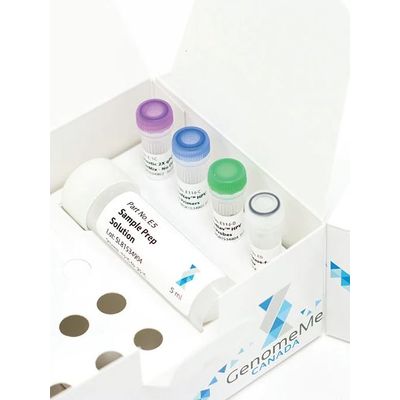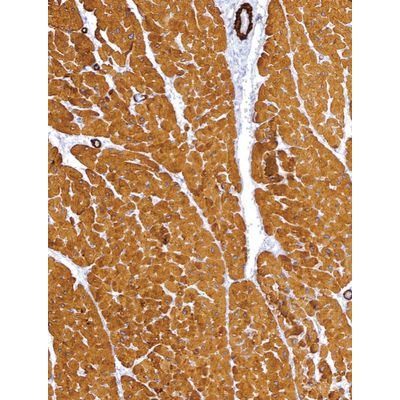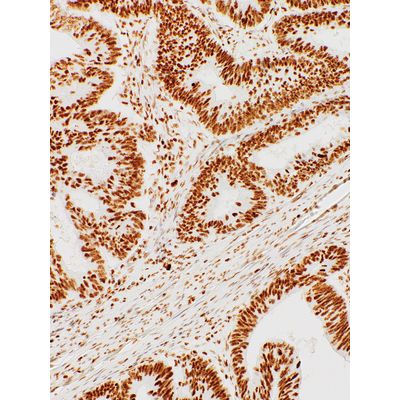

- Home
- Companies
- GenomeMe Lab Inc.
- Products
GenomeMe Lab Inc. products
GenomeCoV19 - Detection Kit
Co-developed with Applied Biological Materials (abm), GenomeMe`s GenomeCoV19 Detection Kit is a real-time reverse transcription polymerase chain reaction (RT-qPCR) test intended for the qualitative detection of RNA from SARS-CoV-2 in human nasopharyngeal and oropharyngeal swab specimens.
Genetic Testing Kit - HPV
GeneNav - HPV One qPCR Kit
The GeneNav™ HPV One qPCR Kit is designed for quick initial screening of individuals for the presence of all 14 High Risk human papilloma virus (HPV) subtypes allowing physicians to identify those at risk for cervical cancer. This in vitro diagnostic kit allows for the specific detection and discrimination between HPV 16, HPV 18, and nonspecific pooled detection of the other 12 high risk HPV subtypes (HPV 31, HPV 33, HPV 35, HPV 39, HPV 45, HPV 51, HPV 52, HPV 56, HPV 58, HPV 59, HPV 66, and HPV 68). A human β-Actin internal control is also used in the GeneNav™ HPV One qPCR Kit to assess specimen quality and ensure the reliability of the HPV detection results.
GeneNav - HPV Complete qPCR Kit
The GeneNav™ HPV Complete qPCR Kit utilizes quantitative PCR (qPCR) technology to detect all 14 High Risk human papilloma virus (HPV) subtypes, allowing physicians to identify those at risk for cervical cancer. In addition, HPV Complete enables detection of HPV types 6 and 11 which are considered low risk for cervical cancer, however they are the cause of 90% of all cases of genital warts as well as respiratory papillomatosis. This in vitro diagnostic kit allows for simultaneous detection of HPV 16 or HPV 18, nonspecific pooled detection of the other 12 high risk HPV subtypes (HPV 31, HPV 33, HPV 35, HPV 39, HPV 45, HPV 51, HPV 52, HPV 56, HPV 58, HPV 59, HPV 66, and HPV 68), and simultaneous detection of low-risk subtypes HPV 6 or 11. A human β-Actin internal control is also used in the GeneNav™ HPV Complete qPCR Kit to assess specimen quality and ensure the reliability of the HPV detection results.
Primary Antibodies
GeneAb - Actin, Muscle Specific Antibody
Actin is part of the cytoskeletal system of every cell type. It can be classified based on isoelectric points as alpha, beta, and gamma. Muscle Specific Actin includes those of the alpha and gamma isotypes. Skeletal, smooth, and cardiac muscle cells will all stain positively with Anti-Muscle Specific Actin, but mesenchymal cells, not including myoepithelium, will stain negatively. Normal and neoplastic non-muscle cells, including vascular endothelial and connective tissues, carcinomas, melanomas, and lymphomas, will also be negative for muscle specific actin. The use of Anti-Muscle Specific Actin in concert with Anti-Smooth Muscle Actin can allow for differentiation between rhabdomyosarcoma and leiomyosarcoma, as muscle specific actin is found in rhabdomyoblasts, while smooth muscle actin is found in leiomyosarcomas.
GeneAb - 5-methylcytosine Antibody
5-methylcytosine (5-mC) is formed from the DNA methylation of the 5-carbon found on the cytosine ring. A 5-methylcytosine monoclonal antibody is a useful tool in identifying and discriminating between the unmodified cytosine base (C) and the methylated cytosine base (5-mC) as part of DNA methylation studies. DNA methylation plays an important role in the repression of transcription in the genome. When present in promoter regions, 5-mC is associated with stable transcriptional silencing which results in inactivation of gene function, thereby having an important role in tumorigenesis.





